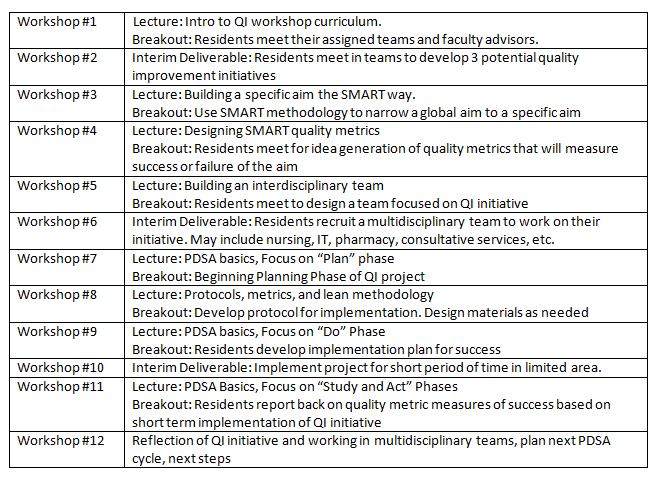Engaging Residents in QI, the SMART way.
Authors: Gabriella Sherman, MD and Luis Dimen, MD
Background:
Residency programs across the country have implemented various quality improvement (QI) lecture series in an effort to engage residents in QI projects. Despite the many resources available to residents, they have limited time to utilize the tools to complete a QI project. QI often turns into an “add- on” lecture to meet an ACGME requirement, or an elective that spans 2-4 weeks and often results in few measurable outcomes. Thus, after conducting a program needs assessment it was clear that both faculty and residents needed a structured and integrated QI curriculum that leverages time spent in lectures to develop and implement resident run QI projects.
Purpose:
Design and implement a quality improvement workshop series dedicated to improving resident engagement in quality improvement initiatives the SMART way, by using specific, measurable, achievable, relevant and time bound metrics to measure our own success with implementation.
Our residency program desired to integrate quality improvement in our regular lecture series and utilize the time spent with our residents and hospitalist faculty in improving resident identified systems issues. By the end of the year, residents have developed a SMART Aim, identified quality metrics that are used to track success, built an interdisciplinary team, and completed at least one full cycle of PDSA (Plan Do Study Act).
Description:
A program needs assessment and gap analysis were conducted which revealed that there are several gaps which need to be addressed:
-
Structured QI curriculum
-
QI lectures that functioned as workshops to enable residents to apply QI methodology to real life projects
-
Multidisciplinary team based projects
-
Hospitalist faculty guidance
-
Opportunity to identify systems based issues that affect residents and their patients
A workshop series was developed that integrated QI principles from the Society for Hospital Medicine Center for Hospital Innovation with real time quality improvement applications. The series was run over the course of 12 months with residents meeting monthly with their assigned resident team members and faculty advisors.
Each workshop centered on educating the residents about specific QI methodology and was followed by a breakout session workshop to apply the concepts to their identified initiative. (See image for details)
Conclusions:
Quality Improvement is an important topic that needs to be addressed within a residency program curriculum. After several years of a implementing a lecture series, a decision was made to change the QI curriculum to a workshop based approach. By providing residents with a QI toolkit and PDSA framework, they were able to identify systems based issues and convert them into SMART aims and cycle through at least one rendition of PDSA. Both resident and faculty engagement in QI is at an all time high, and this approach has sparked resident interest into creating a supplemental QI rotation during which the residents are able to apply their QI toolkit to an additional project. By modifying the traditional approach to teaching via lectures, we have designed a successful year long workshop series which has proven effective in both teaching QI principles and engaging residents and faculty in QI initiatives.
